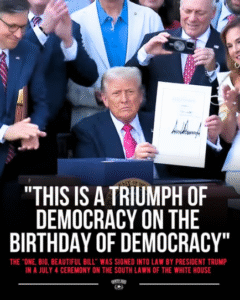President Donald Trump signed what he called the “One, Big, Beautiful Bill” into law on July 4, 2025, marking one of the most sweeping legislative packages of his presidency. The bill includes extensive tax cuts, expanded military spending, immigration enforcement boosts, and significant reductions to social safety net programs. Trump called the legislation “the most popular bill ever signed,” declaring it a victory for American families, workers, and businesses.
The bill extends and expands upon the 2017 tax cuts, making them permanent and introducing new provisions such as eliminating taxes on overtime pay and tips. Small businesses gain new deductions, and estate tax thresholds are raised. Supporters say these provisions will stimulate job growth and entrepreneurial investment. Critics argue the tax benefits overwhelmingly favor high-income earners and corporations.
To offset the tax breaks, the bill slashes funding for programs such as Medicaid, food stamps (SNAP), and housing assistance. It imposes strict work requirements on recipients of federal aid, a move praised by conservatives as encouraging self-sufficiency but condemned by advocacy groups as harmful to low-income families, veterans, and the disabled.
Military spending is significantly boosted under the bill, with over \$150 billion allocated for defense and \$50 billion for border security, including wall expansion. The Department of Homeland Security receives historic funding increases, aimed at enforcement and deportation efforts.
Economists estimate the bill will add between \$2.4 and \$2.8 trillion to the national deficit over the next decade. The Congressional Budget Office warned that while the bill may provide short-term economic growth, long-term debt and inequality will worsen. Credit agencies have already issued warnings about a possible downgrade to U.S. credit ratings.
Democrats slammed the bill as a handout to the wealthy and a threat to the social contract. They say it undermines the most vulnerable Americans while ballooning the national debt. Protests erupted in dozens of cities nationwide following the bill’s passage, with demonstrators calling it “cruel,” “reckless,” and “un-American.”
Despite the backlash, Trump celebrated the bill’s passage with a fireworks-filled ceremony at the White House. He hailed it as a “gift to the American people” and a key part of his legacy. The event included a military flyover and patriotic fanfare, reflecting the administration’s emphasis on strength, nationalism, and economic freedom.
Polls show Americans are deeply divided on the legislation. While Republican voters largely support it, a majority of independents and nearly all Democrats oppose it. As the law begins to take effect, debates over its impact are expected to intensify ahead of the 2026 midterms. For now, Trump’s “One, Big, Beautiful Bill” stands as a defining moment of his second term—ambitious, polarizing, and politically charged.


